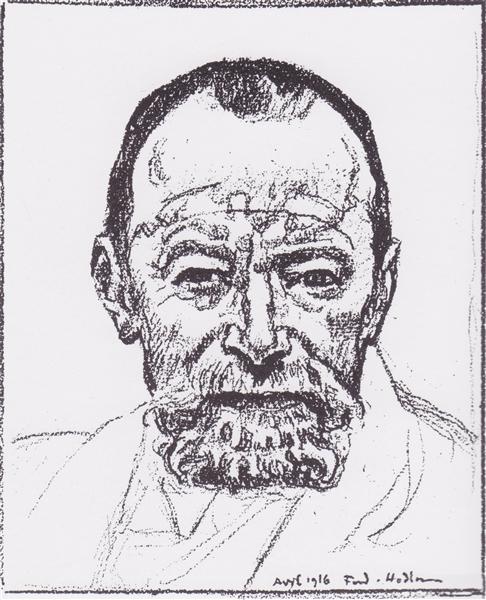Description
The "Self -portrait - 1916" by Ferdinand Hodler is erected as a significant work within the corpus of this prominent Swiss painter. In this composition, Hodler is presented with intensity, revealing an introspective and reflective mood. Through his facial expression and position, the artist offers an window to his inner world, a mirror in which both his technical mastery and his emotional concern are reflected in the last years of his life.
The painting shows Hodler standing, in a forceful foreground. His face, perfectly centered and framed by a neutral background, is imposed on the viewer with a direct and penetrating look. This visual confrontation is no accident; It shows the artist's desire to challenge directly, to establish an intimate dialogue and without barriers with whom he observes his work.
The use of color in this self -portrait is especially revealing. The dull and terrible tones predominate, which contrast with the most living nuances of the artist's skin. They highlight the chiaroscuros that Hodler uses to sculpt his face, using marked shadows that accentuate the bone structure and give depth to his countenance. This technique not only denotes a mastery in handling light and shadow, but also prints a sense of severity and transcendence to portrait.
At the composition level, Hodler does to a sobriety that touches austerity, regardless of superfluous elements that distract from the central theme: himself. This compositional nudity amplifies the psychological load of the portrait, where each stroke seems measured and every intentional shadow.
It is not possible to analyze this work without taking into account the historical and personal moment in which Ferdinand Hodler was. In 1916, the world is immersed in World War I, and Hodler approaches at the end of his life, which will conclude in 1918. This era of great tumult and personal reflection is projected in the disturbing serenity of the self -portrait, offering an interpretation of a Man aware of the fragility of existence and his own mortality.
The "Self -portrait - 1916" can be compared to other self -portraits of the artist, such as 1912, where introspection and brutal honesty are also perceived with which Hodler is portrayed. Despite the similarities, in the self -portrait of 1916 a more severe note is breathed, perhaps reflecting the weight of the years and the proximity of its own sunset.
Similar works by other contemporary artists may include the self -portraits of Egon Schiele, in which an intense psychological and emotional self -exploration is also palpated, although with a more expressionist style and less content than Hodler's. We could also evoke the works of Edvard Munch, another contemporary whose focus on existential anguish and personal introspection finds Eco in this work by Hodler.
In conclusion, the "Self -portrait - 1916" by Ferdinand Hodler is a masterpiece that encapsulates the intensity of his artistic vision and the depth of his self -examination. This painting is not only a representation of its physical appearance, but also a meditation on its emotional and spiritual state in the last years of its life. The work remains a moving testimony of the ability of art to convey the complexity of human experience.
KUADROS ©, a famous paint on your wall.
Hand-made oil painting reproductions, with the quality of professional artists and the distinctive seal of KUADROS ©.
Art reproduction service with satisfaction guarantee. If you are not completely satisfied with the replica of your painting, we refund your money 100%.

